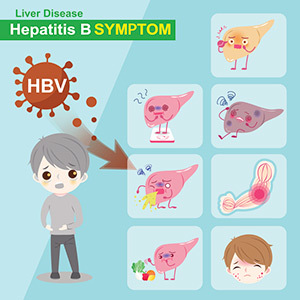
Hepatitis C, a viral infection primarily affecting the liver, is a significant global health concern. Despite its high prevalence and potential severe complications, many people remain unaware of their condition due to the disease's often silent nature. It is, therefore, critical to understand and appreciate the intricacies of this virus and the available treatment options. This guide aims to provide a comprehensive overview of Hepatitis C, discussing its transmission, symptoms, and the latest effective therapies. It offers a pathway towards better understanding and management of the disease.
Understanding Hepatitis C: A Comprehensive Overview of the Virus
Hepatitis C is a viral infection that causes liver inflammation, potentially leading to serious liver damage. The hepatitis C virus (HCV) is primarily spread through contaminated blood. Recognizing how it operates is key to effective treatment. HCV belongs to the Flaviviridae virus family, and the virus has six distinct genotypes. These genotypes have different geographic distributions and response rates to treatment.
Breaking Down Hepatitis C Treatment: Current Approaches and Medications
Recent advances in medical science have significantly improved the treatment of Hepatitis C. Today's treatments primarily involve antiviral medications intended to clear the virus from the body with the goal of a cure. Direct-acting antivirals (DAAs) are the latest medications used to treat Hepatitis C. These drugs target specific steps in the virus's lifecycle, preventing it from replicating and reducing its viral load.
Direct-Acting Antivirals (DAAs): Revolutionizing Hepatitis C Treatment
Direct-acting antivirals (DAAs) have transformed Hepatitis C treatment, offering higher cure rates, shorter treatment durations, and fewer side effects than older therapies. These medications directly target the HCV virus, stopping it from multiplying. They are often used in combination with other medications to improve their effectiveness and reduce the risk of drug resistance.
The Treatment Process: What to Expect During Hepatitis C Therapy
Treatment typically involves taking oral medications for 8-12 weeks. The exact medication and duration depend on the Hepatitis C genotype, the extent of liver damage, previous treatments, and coexisting medical conditions. Regular blood tests will be necessary during treatment to monitor the virus's response and track any potential side effects. It is essential to follow the prescribed treatment regimen strictly for optimal outcomes.
Monitoring and Managing Side Effects: A Critical Aspect of Treatment
While modern Hepatitis C treatments have fewer side effects, monitoring for any adverse reactions and managing them appropriately is still important. Common side effects include headache, fatigue, and nausea. If side effects become severe, it is essential to consult a healthcare provider immediately. It is also crucial to disclose any existing medical conditions and medications to avoid potential drug interactions.
The Importance of Adherence to Treatment Regimens in Hepatitis C
Adherence to the prescribed treatment regimen is critical to achieve the best outcome. Skipping doses or stopping treatment early can lead to drug resistance and treatment failure. Communicating openly and honestly with healthcare providers about any barriers or challenges faced during treatment is essential. Support from friends and family can also play a crucial role in helping patients stay on track.
The Road to Recovery: Staying Healthy After Hepatitis C Treatment
Completing treatment does not mean the journey ends there. Individuals cured of Hepatitis C should continue to monitor their liver health and make lifestyle changes to maintain good overall health. This may include avoiding alcohol, maintaining a healthy diet, and staying up-to-date with recommended vaccinations.
Combating Hepatitis C with Lifestyle Changes and Supportive Care
In addition to antiviral treatment, lifestyle changes like avoiding alcohol, eating a balanced diet, and regular exercise can support liver health. Supportive care, including regular liver function tests and counseling, may also be part of the treatment plan. Support groups and counseling can also provide emotional support and help individuals cope with the physical and psychological impacts of Hepatitis C.
Vaccine Development and Prevention Strategies Against Hepatitis C
While there is no vaccine for Hepatitis C, ongoing research in this area holds promise. Prevention strategies focus on reducing the risk of HCV transmission, such as safe needle practices and screening blood donations. It is also essential for individuals to be aware of potential risk factors and get tested regularly, particularly those with a history of injection drug use or blood transfusions before 1992.
Understanding the Risks of Hepatitis C Reinfection and Measures to Prevent It
Post-treatment, it's important to understand that being cured of Hepatitis C does not confer immunity. Reinfection is possible, and preventive measures should continue to be followed. This includes avoiding high-risk behaviors and seeking prompt medical care if exposed to contaminated blood or needles. Hepatitis C may be a chronic disease, but individuals can still lead healthy lives with effective treatment and preventive measures.
Emerging Treatments and Future Outlook in Hepatitis C Management
Research is ongoing to develop new treatments for Hepatitis C, especially for cases that don't respond to current therapies. The future of Hepatitis C treatment looks promising, with the potential for more effective and accessible options. However, prevention and early detection remain critical in reducing the burden of this disease. With continued efforts and advancements, we can hope for a future where Hepatitis C is no longer a global health threat. So, while we have made significant progress in understanding and treating Hepatitis C, much more must be done. As such, it's crucial to continue spreading awareness.
